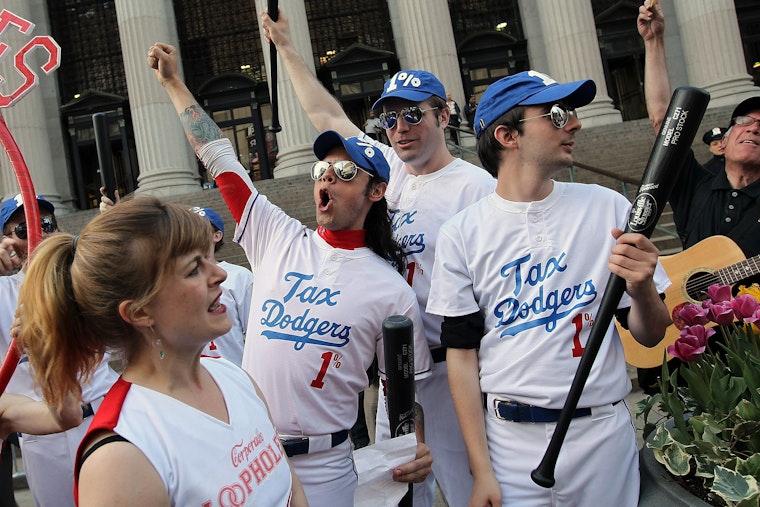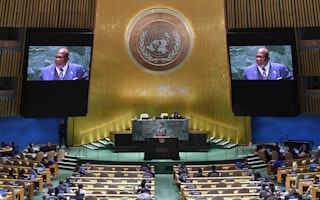Tax Injustice Goes Well Beyond Trump
By Julie McCarthy

It is indeed outrageous that U.S. President Donald Trump paid only $750 in federal income taxes in 2016, following a year when he officially valued his own net worth at nearly $9 billion. To learn from reporting by the New York Times that Trump has paid no taxes at all for half of the past 20 years, and that he received nearly $73 million in tax refunds in 2010, feels like an insult to every hard-working, tax-paying American.
But Trump is not alone. The president is emblematic of a larger cohort—America’s wealthiest individuals and companies—who can all afford the professional lawyers and accountants that enable them to skirt tax law and often earn billions while contributing little to nothing back to the public purse. As he noted in Tuesday’s presidential debate, “I don’t want to pay taxes. . . like every other private person, unless they’re stupid, they go through the laws. . . ” And, by Trump’s implication, find ways around them.
There is no greater example of elite and corporate capture of economic policy in this country today than taxation, or the lack of it. The wealthy benefit daily from the fruits of publicly funded infrastructure, universities, research and development, public safety and security, federally insured loans, and innumerable other public goods. And yet most pay little to nothing back to the federal government. Indeed, many use their increasing wealth to lobby for laws that continue to protect and enhance their wealth and ability to free ride, by putting the burden on middle- and lower-income Americans.
Meanwhile those who struggle to make enough to pay their monthly bills, don’t earn enough to afford health care, and are financially devastated by an unanticipated medical event, will not only pay far more each year in taxes, they will also receive far more scrutiny from the IRS. In 2019, the IRS admitted that it does not audit the richest companies and individuals because it doesn’t have the human capacity and resources to deal with the complexity involved. A ProPublica investigation found that a person is more likely to get audited if they make $20,000 a year than if they make $400,000.
Corporate tax avoidance in America is a shameful open secret, made that much more appalling by the gross levels of inequality, soaring debt, and inability of Congress to find money for the most basic social supports and public health services in the midst of an economic depression and pandemic. Indeed, the Trump Administration used the 2020 Pandemic relief bill to slip in an obscure $135 billion tax break for the richest 1 percent of Americans, giving 43,000 millionaires a $1.6 million tax break each (mainly for owners of real estate and/or private equity firms, as well as hedge funds).
Prior to 2016, outside corporate influence over Congress had resulted in an increasingly regressive tax system that enabled the wealthiest Americans to pay historically low tax rates, while the working class tax burden continued to rise. In 2019, Gabriel Zucman and Emmanuel Saez noted that this was not always the case. In fact, this is the first time in almost a century that “the working class”—the 50 percent of Americans with the lowest incomes—today pays higher tax rates than billionaires.
Trump’s 2017 tax reform bill, the largest overhaul of our tax code in 30 years, was a massive and unapologetic corporate giveaway that is estimated to cost the rest of us around $1.9 trillion over the next decade. As the Center for American Progress notes, for $1.9 trillion, the U.S. could eliminate child poverty, massively expand investment in fighting climate change, provide universal childcare and pre-kindergarten, provide free community college for all, and so much more.
But Trump didn’t just squander the moment; he intentionally used it to loot the working class further.
A 2020 report by the nonpartisan institute on taxation and economic policy found that of nearly 400 Fortune 500 companies, with a cumulative profit of $765 billion, 147 of them paid less than 5 percent in taxes to the federal government. Pause there for a moment. Nearly thirty percent of Fortune 500 companies now have less than a 5 percent tax rate, thanks to Trump and friends.
It doesn’t have to be this way. Reversing the 2017 tax reforms and introducing a wealth tax and a minimum corporate tax—something that many billionaires with a conscience support—would go a long way towards beginning to remedy this gross inequality. Until then, Trump’s still laughing at us, all the way to the bank.

Until November 2021, Julie McCarthy was co-director of the Open Society Economic Justice Program.


